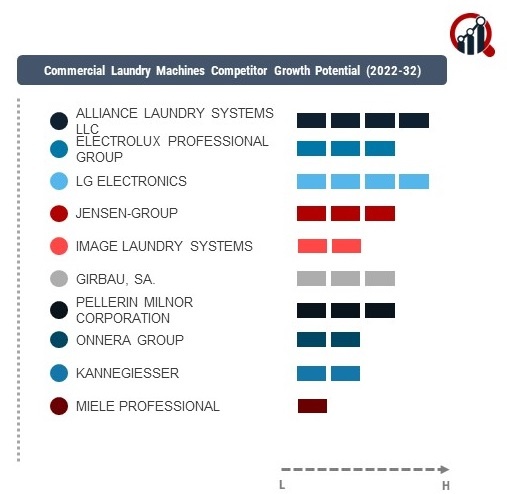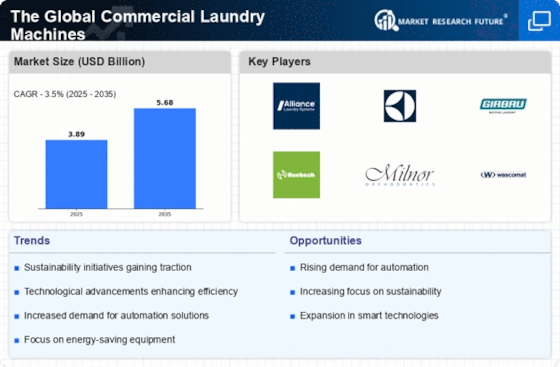Top Industry Leaders in the Commercial Laundry Machines Market
 The competitive landscape of the commercial laundry machines market is shaped by key players employing various strategies to cater to the needs of the hospitality, healthcare, and other industries relying on efficient laundry solutions. As of 2023, significant players have established their positions, focusing on technological innovation, market expansion, and customer service to maintain a competitive edge.
The competitive landscape of the commercial laundry machines market is shaped by key players employing various strategies to cater to the needs of the hospitality, healthcare, and other industries relying on efficient laundry solutions. As of 2023, significant players have established their positions, focusing on technological innovation, market expansion, and customer service to maintain a competitive edge.
Key Players:
Alliance Laundry System LLC (US)
Electrolux Professional Group (Sweden)
LG Electronics Inc. (South Korea)
Jensen-Group (Belgium)
Image Laundry Systems (Thailand)
Girbau, S.A. (Spain)
Pellerin Milnor Corporation (US)
Onnera Group (Spain)
Kannegiesser (Germany)
Miele Professional (Germany)
ASKO Appliances (Slovakia)
Dexter Laundry (US)
Shanghai Sailstar Machinery Group Co. Ltd. (China)
Jiangsu Sea-lion Machinery Co., Ltd. (China)
Strategies Adopted:
Strategies adopted by key players revolve around innovation, partnerships, and global market penetration. Alliance Laundry Systems invests significantly in research and development to introduce advanced features, such as cloud-based management systems and energy-efficient technologies. Whirlpool Corporation leverages its established presence in the residential market to cross-promote its commercial laundry machines and expand its customer base. Miele & Cie. KG focuses on premium positioning and emphasizes the durability and advanced functionality of its commercial laundry equipment. Electrolux AB adopts a global expansion strategy, providing a range of commercial laundry solutions tailored to different market segments. Dexter Laundry emphasizes customization, offering a variety of options to suit the specific needs of diverse industries.
Market Share Analysis:
The commercial laundry machines market is influenced by factors such as product reliability, efficiency, after-sales service, and pricing. Companies that excel in delivering durable and energy-efficient solutions, along with responsive customer support, tend to secure a larger market share. Additionally, effective marketing strategies, partnerships with distributors, and a global presence contribute significantly to market penetration.
News & Emerging Companies:
The commercial laundry machines market have gained traction in 2023, introducing innovative technologies and sustainability initiatives. Startups like Xeros Technology Group and Girbau focus on water-saving technologies and environmentally friendly laundry solutions. While their market share may be relatively modest compared to industry giants, their emphasis on sustainability aligns with the growing demand for eco-friendly commercial laundry practices.
Industry Trends:
Industry trends highlight the ongoing technological advancements and sustainability efforts within the commercial laundry machines market. Companies are investing in developing machines that reduce water and energy consumption, aiming to align with environmentally conscious practices. Additionally, collaborations with facility management companies and hotels, along with the implementation of Internet of Things (IoT) technologies for remote monitoring and maintenance, reflect the industry's adaptation to evolving customer needs and technological trends.
Competitive Scenario:
The commercial laundry machines market reflects a blend of established players and emerging disruptors, all navigating a landscape shaped by technological advancements and sustainability considerations. Key players maintain their dominance through innovation, extensive product portfolios, and global reach. Emerging companies contribute to the market's dynamism with a focus on sustainability, customization, and advanced technologies. The competition is further intensified by the entry of technology-focused startups, international expansions, and the increasing demand for energy-efficient and environmentally friendly commercial laundry solutions.
Recent Development
The integration of Artificial Intelligence (AI) in commercial laundry machines. Some key players have introduced AI-powered features that optimize washing cycles based on usage patterns and fabric types. This development not only enhances efficiency but also aligns with the industry's commitment to delivering intelligent and user-friendly laundry solutions.











